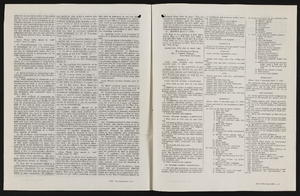Search the Special Collections and Archives Portal
Search Results
Las Vegas Sun Photographs
Identifier
Abstract
The Las Vegas Sun Photographs depict significant events in Las Vegas, Nevada from 1948 to 1989 that were covered by the newspaper. The photographs partially document the gubernatorial, senatorial, mid-term, and local elections in Nevada in 1982. The photographs also include protests by African Americans for better wages and renters for fair housing practices, McCarran Airport, protests against the Nevada Test Site, the Las Vegas Strip and downtown Las Vegas, hotels and casinos, political events, parades, dedications of buildings, and aerial photographs of the city. The photographs also depict politicians during campaign events and fundraisers, including President Ronald Reagan; U.S. Senators Howard Cannon, Pat McCarran, Chic Hecht, Paul Laxalt, and Harry Reid; Nevada governors Mike O'Callaghan and Robert List; and Lieutenant Governor Bob Cashell.
Archival Collection
Maurine and Fred Wilson and Dr. William S. Park Photograph Albums
Identifier
Abstract
The Maurine and Fred Wilson and Dr. William S. Park Photograph Albums (1900-1930s) consist of twelve albums containing black-and-white photographic prints and three black-and-white photographic negatives. The photographs are primarily related to the families of William S. Park, John S. Park, and Fred and Maurine Hubbard Wilson. Included are images of the Park homes in Las Vegas, Nevada; Park and Wilson family members; scenes of early Las Vegas, Nevada; outdoor activities, and vacation trips to California, Colorado, and Mexico.
Archival Collection
Bob Stupak Professional Papers
Identifier
Abstract
The Bob Stupak Professional Papers (approximately 1900 to 2007) primarily documents the career of Las Vegas, Nevada casino owner, Bob Stupak. The materials in the collection include the planning of two resorts in Las Vegas, Nevada created by Bob Stupak: Vegas World and the Stratosphere. The collection also includes planning materials for the Titanic Las Vegas, an unbuilt resort envisioned by Stupak. Planning and promotional materials for Stupak's resorts including photographs, memorabilia, audiovisual materials, advertising mockups, and architectural drawings. The collection includes several scrapbooks and photographs of Stupak and his wife Sandy at events around Las Vegas. The materials also document Stupak's political campaigns running for mayor of Las Vegas in 1983 and 1987 and lieutenant governor of Nevada in 2006.
Archival Collection

University of Nevada, Las Vegas (UNLV) 6th commencement program
Date
Archival Collection
Description
Commencement program from University of Nevada, Las Vegas Commencement Programs and Graduation Lists (UA-00115).
Text
Dina Neal (Nevada Legislature, Senator) oral history interview conducted by Magdalena Martinez and Makada Henry-Nickie: transcript
Date
Archival Collection
Description
From the Lincy Institute "Perspectives from the COVID-19 Pandemic" Oral History Project (MS-01178) -- Elected official interviews file.
Text
Vera Moore (True Beginnings/Divinity House) oral history interview conducted by Kelliann Beavers and Elia Del Carmen Solano-Patricio: transcript
Date
Archival Collection
Description
From the Lincy Institute "Perspectives from the COVID-19 Pandemic" Oral History Project (MS-01178) -- Community organization interviews file.
Text

Transcript of interview with Dr. Catherine Bellver by Caryll Batt Dziedziak, November 13, 1995
Date
Archival Collection
Description
Dr. Catherine Bellver is a woman with tenacity. How else could one describe her drive to create the Women's Studies Program spanning fifteen years? As a faculty member in the Department of Foreign Languages, Dr. Bellver first joined the Women's Studies steering committee in 1979. In the following decade, the committee oversaw the formation of the Women's Studies Program, including: procuring administrative and faculty support, creating bylaws and course criteria, critiquing proposed cross-listed courses, and selecting course offerings. During that period she also worked with a volunteer group to create and staff the first Women's Center on campus. In the early Nineties, she played an instrumental role in the presentation of four public colloquia that addressed key issues pertaining to women. Dr. Bellver acted as interim director of the Women's Studies Program while overseeing the search for a permanent director. She continued to remain involved with the Women's Studies program, serving as faculty member on several committees. She has also worked in the Women's Caucus on the regional and national levels of the Modem Languages Association Dr. Bellver is currently Distinguished Professor of Spanish in the Department of Foreign Languages at the University of Nevada, Las Vegas. Her work has appeared in journals such as Anales de la Literature Espanola Contemporanea, Hispanic Review, Hispanofila, Insula, Journal of Interdisciplinary Studies, Monographic Review/Revista Monografica, Revista de Estudios Modernos, Revista Hispanica Moderna, Romance Notes and Romanic Review. Dr. Bellver's participation in the creation of the Women's Studies Program illustrates how critical institutional and social progress can result from the commitment of a determined group of individuals. Her decades of involvement in creating an academic arena for the study of women and gender issues underscores the significance of women's contributions to the history of Las Vegas. In addition to the history of the Women's Studies Program at the University of Nevada Las Vegas this interview contains information regarding the creation of the first Women's Center on campus.
Text

Alpha Kappa Alpha Sorority, Theta Theta Omega Chapter calendars
Date
Archival Collection
Description
From the Alpha Kappa Alpha Sorority, Incorporated, Theta Theta Omega Chapter Records (MS-01014) -- Chapter records file.
Text

